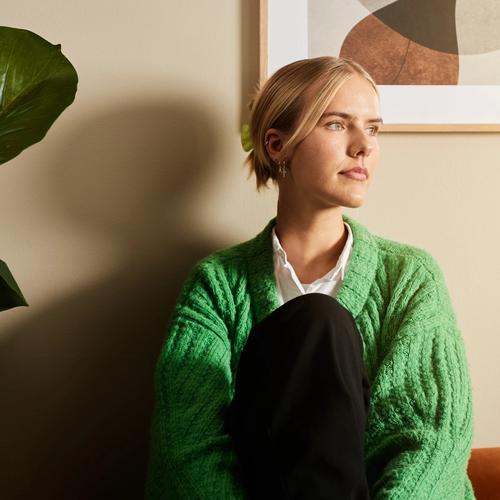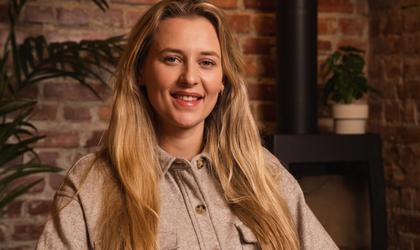Practice uncomfortable social situations with VR
Many people experience discomfort in social situations at some point in their lives, and it can feel challenging to do something about this. With us, you can now practice social situations in VR in consultation with a psychologist to take the first step towards a slightly easier everyday life.
VR-training can be a good option for people with social anxiety as well as for those who experience discomfort in social situations at work, at school or in other every day situations. Our solution allows you to practice a wide range of situation, such as job interviews, giving a presentation in class or attending a dinner party. Read more about available situations here.
- Developed in close collaboration with our psychologists
- Start with a conversation with a psychologist, and together you will assess whether VR training is right for you


Customized for you
With the help of artificial intelligence, situations can be adapted to you. For example, you can choose the topic of your conversation or which job you have applied for.

Conversations in VR
In VR, you meet characters who listen to what you say and respond to you. That way, you can have conversations similar to the ones you would have in real life.

Follow-up
The therapy continues together with your psychologist, and the VR training becomes a tool you use in the sessions with the psychologist to practice situations you encounter at work.
What is VR?
VR stands for Virtual Reality, or virtual reality in Norwegian. VR allows users to experience virtual situations in three dimensions using VR glasses. The glasses have screens in the entire field of vision and motion sensors that give the user a feeling of being present in the simulated environment. This allows us to use VR to provide the same exposure training as one could do "in real life".
Situations you recognize
Together with your psychologist, you find out which situations are relevant for you to practice. You can e.g. practice
- Job interview
- Conversation with manager
- Presentation in classroom
- Presentation in auditorium
- Presentation in group meeting
How to get back the feeling of mastery
To become more comfortable in situations you encounter at work, conversations with a psychologist combined with gradual training in work situations is a common approach. VR training can help to reduce the barriers because you can choose your own pace, progress and how often you train.
At Dr. Dropin Psykologi, you choose yourself, together with your psychologist, which approach suits you best:
1. Traditional course with a psychologist
2. Course with a psychologist combined with VR training
Why VR training
VR training can be more practical and accessible for many, if one is very reluctant to seek out social situations "in real life". VR training can also lower the threshold for getting started when you know it's just a simulation. With VR training, you also get the opportunity to get to know the discomfort you feel in a safe environment where your psychologist is present.
Our VR solution has been developed in close collaboration with our psychologists and people-lovers who will be safer in situations at work. All our VR-qualified psychologists have themselves practiced social situations in VR, and can recommend scenarios and how to proceed to get the most out of the VR training.
Tailor your VR training
With the help of AI (artificial intelligence), you can have natural conversations with the characters you meet in VR. You can choose between leading the conversation yourself, or letting them take the lead. They listen to what you say and respond to you. Talk about the weather, ask them about their lives or talk about your interests - it's all up to you.
You yourself get the opportunity to adapt the situations, so that they become even more relevant to you. For example, you can choose which position you have applied for in the job interview, or upload your presentation and present in front of a full auditorium in VR.
Our psychologists who offer VR training

Rikke
With genuineness, warmth and acceptance, Rikke wants it to feel safe to explore difficult topics in the therapy room. This can, for example, be stuck thoughts and feelings, repetitive life patterns and reactions to bad events. Together you will find goals for the therapy, as well as the approach and pace that suits you best.
Frequently asked questions
Q: How do I know if VR training is right for me?
A: Practicing social situations in VR can be helpful for many, whether you have a diagnosis or not. Before the VR training, you always have an appointment with a psychologist to find out what is best for the individual. If you are interested in hearing more about VR training, or think it might be for you, book an appointment with a psychologist.
Q: How long does a training in VR last?
A: You always control how long you exercise, and can end the exercise at any time during the course.
Q: How often do I have to train in VR?
A: Together with the psychologist, you will make a plan - how much and how often you should exercise.
Q: How do I choose intensity?
A: You always choose the intensity level yourself before you start the training. If you find that the training is too intense, you will always be able to go back and choose a lower intensity. The psychologist can also help you find out which intensity suits you best.
Q: What social situations can I practice?
A: When you use the VR glasses you can choose between different social situations to which you are exposed:
Social - dinner party or mingle at a party.
Job - job interview, job meeting, conversation with colleagues, conversation with a manager or presentation in an auditorium.
School - group work, presenting in front of the class or talking to a teacher.

